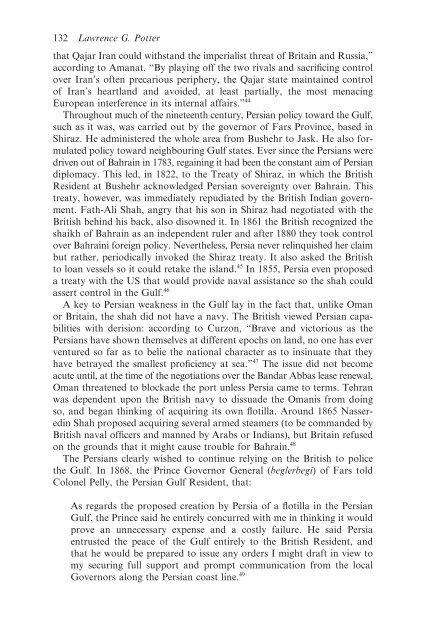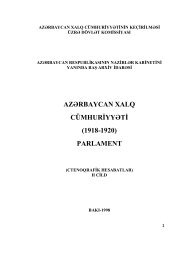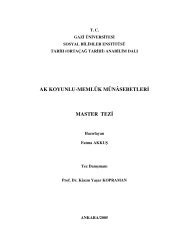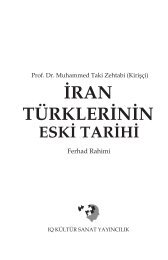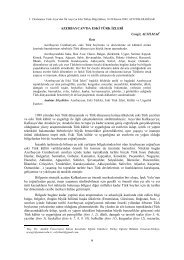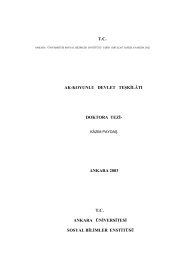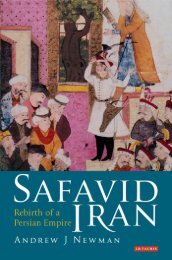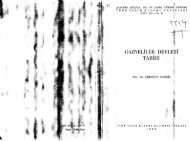War and Peace in Qajar Persia: Implications Past and ... - Oguzlar.az
War and Peace in Qajar Persia: Implications Past and ... - Oguzlar.az
War and Peace in Qajar Persia: Implications Past and ... - Oguzlar.az
- No tags were found...
Create successful ePaper yourself
Turn your PDF publications into a flip-book with our unique Google optimized e-Paper software.
132 Lawrence G. Potterthat <strong>Qajar</strong> Iran could withst<strong>and</strong> the imperialist threat of Brita<strong>in</strong> <strong>and</strong> Russia,”accord<strong>in</strong>g to Amanat. “By play<strong>in</strong>g off the two rivals <strong>and</strong> sacrific<strong>in</strong>g controlover Iran’s often precarious periphery, the <strong>Qajar</strong> state ma<strong>in</strong>ta<strong>in</strong>ed controlof Iran’s heartl<strong>and</strong> <strong>and</strong> avoided, at least partially, the most menac<strong>in</strong>gEuropean <strong>in</strong>terference <strong>in</strong> its <strong>in</strong>ternal affairs.” 44Throughout much of the n<strong>in</strong>eteenth century, <strong>Persia</strong>n policy toward the Gulf,such as it was, was carried out by the governor of Fars Prov<strong>in</strong>ce, based <strong>in</strong>Shir<strong>az</strong>. He adm<strong>in</strong>istered the whole area from Bushehr to Jask. He also formulatedpolicy toward neighbour<strong>in</strong>g Gulf states. Ever s<strong>in</strong>ce the <strong>Persia</strong>ns weredriven out of Bahra<strong>in</strong> <strong>in</strong> 1783, rega<strong>in</strong><strong>in</strong>g it had been the constant aim of Persi<strong>and</strong>iplomacy. This led, <strong>in</strong> 1822, to the Treaty of Shir<strong>az</strong>, <strong>in</strong> which the BritishResident at Bushehr acknowledged <strong>Persia</strong>n sovereignty over Bahra<strong>in</strong>. Thistreaty, however, was immediately repudiated by the British Indian government.Fath-Ali Shah, angry that his son <strong>in</strong> Shir<strong>az</strong> had negotiated with theBritish beh<strong>in</strong>d his back, also disowned it. In 1861 the British recognized theshaikh of Bahra<strong>in</strong> as an <strong>in</strong>dependent ruler <strong>and</strong> after 1880 they took controlover Bahra<strong>in</strong>i foreign policy. Nevertheless, <strong>Persia</strong> never rel<strong>in</strong>quished her claimbut rather, periodically <strong>in</strong>voked the Shir<strong>az</strong> treaty. It also asked the Britishto loan vessels so it could retake the isl<strong>and</strong>. 45 In 1855, <strong>Persia</strong> even proposeda treaty with the US that would provide naval assistance so the shah couldassert control <strong>in</strong> the Gulf. 46A key to <strong>Persia</strong>n weakness <strong>in</strong> the Gulf lay <strong>in</strong> the fact that, unlike Omanor Brita<strong>in</strong>, the shah did not have a navy. The British viewed <strong>Persia</strong>n capabilitieswith derision: accord<strong>in</strong>g to Curzon, “Brave <strong>and</strong> victorious as the<strong>Persia</strong>ns have shown themselves at different epochs on l<strong>and</strong>, no one has everventured so far as to belie the national character as to <strong>in</strong>s<strong>in</strong>uate that theyhave betrayed the smallest proficiency at sea.” 47 The issue did not becomeacute until, at the time of the negotiations over the B<strong>and</strong>ar Abbas lease renewal,Oman threatened to blockade the port unless <strong>Persia</strong> came to terms. Tehranwas dependent upon the British navy to dissuade the Omanis from do<strong>in</strong>gso, <strong>and</strong> began th<strong>in</strong>k<strong>in</strong>g of acquir<strong>in</strong>g its own flotilla. Around 1865 Nassered<strong>in</strong>Shah proposed acquir<strong>in</strong>g several armed steamers (to be comm<strong>and</strong>ed byBritish naval officers <strong>and</strong> manned by Arabs or Indians), but Brita<strong>in</strong> refusedon the grounds that it might cause trouble for Bahra<strong>in</strong>. 48The <strong>Persia</strong>ns clearly wished to cont<strong>in</strong>ue rely<strong>in</strong>g on the British to policethe Gulf. In 1868, the Pr<strong>in</strong>ce Governor General (beglerbegi) of Fars toldColonel Pelly, the <strong>Persia</strong>n Gulf Resident, that:As regards the proposed creation by <strong>Persia</strong> of a flotilla <strong>in</strong> the <strong>Persia</strong>nGulf, the Pr<strong>in</strong>ce said he entirely concurred with me <strong>in</strong> th<strong>in</strong>k<strong>in</strong>g it wouldprove an unnecessary expense <strong>and</strong> a costly failure. He said <strong>Persia</strong>entrusted the peace of the Gulf entirely to the British Resident, <strong>and</strong>that he would be prepared to issue any orders I might draft <strong>in</strong> view tomy secur<strong>in</strong>g full support <strong>and</strong> prompt communication from the localGovernors along the <strong>Persia</strong>n coast l<strong>in</strong>e. 49


